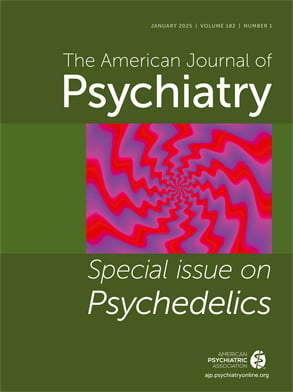To the Editor: We thank Dr. Meduri and Dr. Shih for their interest in our work and wish to provide clarifications on the points raised.
Regarding the first point, based on findings referenced in our article (
1), we chose depressive symptoms to identify outcomes because these codes recorded by the general practitioners reflect true family practice, in which physicians are more likely to record symptoms than a definite diagnosis. Exclusion of these codes would have led to an underestimation of the incidence rates and a classification bias, as general practitioners may be more likely to record symptoms than diagnoses for a neuropsychiatric illness attributable to glucocorticoid exposure with the view that the symptoms would improve once glucocorticoids were stopped or reduced. Psychiatric referral was similar between the group of patients who were exposed to glucocorticoids and patients who were not. However, as specified in the article, the term “psychiatric referral” refers to consultation with a psychiatrist without any details of the experienced symptoms. These referrals may relate to the neuropsychiatric disorders we studied or to other psychiatric illnesses and symptoms such as anxiety or eating disorders. These referrals concerned only 108 people, compared with the 10,221 patients for whom details of the symptoms or illnesses were available.
Regarding the second point, the phrase “high incidence of neuropsychiatric adverse events in the first 3 months of glucocorticoid treatment” is misleading. As specified in the Method section, we studied the events that occurred from the beginning of the exposure until the end of the exposure, which was up to 3 months after treatment initiation for long-term exposures. This means that for short-term exposures (i.e., those lasting less than 3 months), the at-risk period was defined as the exposed period, which may have lasted only a few days.
Lastly, we agree that glucocorticoid treatment is a marker of disease severity and that it is difficult to differentiate its accountability on neuropsychiatric disorders occurrence to that of the disease severity itself. We addressed this issue in the Discussion section of our article. However, the effects of glucocorticoids can be separated from those of disease severity only in a randomized controlled trial that includes people with similar levels of disease severity receiving either glucocorticoids or placebo—an ethically unacceptable design. Drs. Meduri and Shih cite three studies regarding the link between some diseases (e.g., asthma, chronic obstructive pulmonary disease, and polymyalgia rheumatica) and depression (
2–
4). In these studies, the link between these diseases and a higher risk of depression is not as clear, and a direct link between glucocorticoids used to treat the somatic illness and the occurrence of depression has been raised (
2,
3). In our study, we found a much stronger association between glucocorticoid exposure and mania or delirium/confusion than between glucocorticoid exposure and depression. This supports the view that glucocorticoids have a role in inducing neuropsychiatric disorders.

